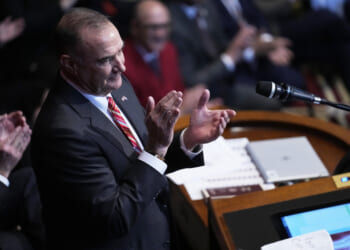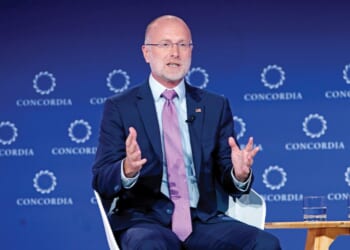When I was in fifth grade, I aced the Presidential Fitness Test. Not because I was some athletic prodigy — I was a large child who’d later become a big man — but because we had a pull-up bar at home. My parents had installed it in a doorway, and like my 5-year-old daughter today, I’d been doing dead hangs since before I could walk. When test day came, I knocked out pull-ups even as some skinnier children struggled. I held my own on the run. I bent far past my toes. None of this seemed remarkable to me. It was just what you did, growing up on the farm and playing and working outdoors.
Last month, President Donald Trump signed an executive order bringing back the Presidential Fitness Test, and the internet immediately erupted with outrage. People shared stories about childhood trauma, about crying in gym class, about how the test ruined exercise for them forever. They describe hanging helplessly from the pull-up bar while classmates watched. Some call it body shaming. Instead of acknowledging their flaws and getting stronger, these people have amplified the discourse around past or present weakness.
That weakness is now rampant, stealing away what should be the most fun and active years of people’s lives. Twenty percent of American children are obese. Not overweight — obese. The childhood obesity rate has tripled since the 1970s. Type 2 diabetes, once called “adult-onset diabetes” because children never got it, now affects thousands of children. The average American teenager can’t do a single pull-up. Military recruiters report that 77% of young people are ineligible for service, mostly due to obesity and lack of fitness. Instead of addressing this directly, we’ve spent the last decade pretending it doesn’t matter.
When Barack Obama replaced the Presidential Fitness Test with the FitnessGram in 2012, the change was telling. Instead of measuring whether children could actually do a pull-up, we started measuring “personal progress” and “goal setting.” Everyone got a participation trophy, metaphorically speaking. No one failed because failure might hurt someone’s feelings.
The old test was simple: a one-mile run, modified sit-ups, a 30-foot shuttle run, the sit-and-reach flexibility test, and a choice between push-ups or pull-ups. Children who scored in the top 15% nationwide earned a Presidential Physical Fitness Award. You either did it or you didn’t. These were basic markers of physical capability that any healthy child should be able to achieve, not arbitrary standards designed to humiliate children.
The folks who are complaining most bitterly reveal something important. They describe the test as something that happened to them, not something they failed to prepare for. They frame their inability to do a pull-up as inevitable, as if human children aren’t naturally designed to climb and hang.
This is simply untrue. Climbing and hanging are things most children can do naturally if they haven’t been spending all their time sitting, not specialized skills. Watch any curious child at a playground, or your own. They grab monkey bars instinctively. They climb everything they can reach.
Of course, the ironies surrounding the relaunch of the test warrant notice. Its return was announced by Triple H, WWE’s chief creative officer, Secretary of Education Linda McMahon’s son-in-law, and a former professional wrestler who retired due to recurring heart problems that look suspiciously similar to those caused by long-term performance-enhancing drug use. Trump himself is a 78-year-old man who appears to subsist primarily on Diet Coke and McDonald’s. His idea of exercise is golf from a cart, although he plays that game (and tennis) at a surprisingly high level. Health and Human Services chief Robert F. Kennedy Jr., the suspiciously ripped septuagenarian who stood beside Trump during the announcement talking about his fond memories of the test, has his own rather complicated relationship with physical and mental health.
All of that is beside the point. The test isn’t about them. It’s about whether American children can do basic physical tasks humans have been doing for thousands of years. The executive order cites “the threat to the vitality and longevity of our country that is posed by America’s declining health and physical fitness.” It notes that “rates of obesity, chronic disease, inactivity, and poor nutrition are at crisis levels, particularly among our children.”
A healthy society is made up of healthy people. We can’t force anyone to be fit, but we can establish fitness as an expectation, a norm, something we measure and value. We can stop pretending that physical capability is optional, that obesity is inevitable, that children are naturally sedentary.
THE WNBA SHOULD GUARD CAITLIN CLARK LIKE GOLD
Some children will struggle. Some will beat themselves up about struggling. The alternative, which is this primrose path we’ve been on, is to pretend physical fitness doesn’t matter, to replace objective standards with subjective assessments, to act like childhood obesity is just another lifestyle choice. If you can’t do a pull-up, that’s not the test’s fault. That’s your body telling you something important. The people who hated the test, who still nurse grievances about bombing it in fifth grade or thereafter, never learned the lesson it was trying to teach. When you fail at something physical, the answer isn’t to eliminate the test. The answer is to get stronger.
Like any other test, the Presidential Fitness Test is far from perfect. However, in its own simple way, it distills an essential truth: You can either do a pull-up and run a mile or you can’t. Your body either works properly or it doesn’t. If it doesn’t, that’s a problem that needs solving. No amount of reframing or personal progress tracking will change that basic physical reality. The pull-up bar and 400-meter oval track will still be there, waiting, completely indifferent to how you feel about them.
Oliver Bateman is a journalist, historian, and cohost of the What’s Left? podcast. Visit his website: www.oliverbateman.com.















